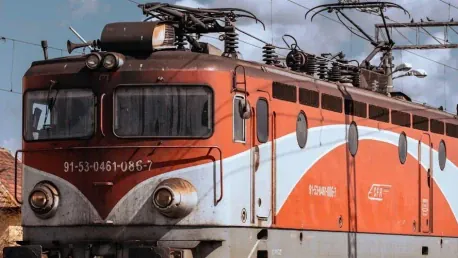The Middle East is on the brink of a major transformation in its logistics framework, driven by the launch of a new rail shuttle service by Noatum Logistics, an AD Ports Group company. This groundbreaking service interlinks Khalifa Port and Fujairah Terminals, blending the capabilities of land, sea, and air transport to create a cohesive and comprehensive logistics network. With the UAE’s national railway network, managed by Etihad Rail, providing the backbone for this initiative, the new rail service not only promises to enhance connectivity within the UAE but also aims to significantly boost economic growth and development across the broader Middle East.
Launching a Rail Logistics Revolution
Noatum Logistics’ new rail service represents a monumental moment in the logistics landscape of the Middle East, introducing a dynamic alternative to conventional road transport. By directly connecting key ports such as Khalifa Port and Fujairah Terminals, the service addresses some of the critical gaps in the current supply chains. The offering consists of weekly departures, each capable of handling up to 156 Twenty-Foot Equivalent Units (TEUs) or 78 Forty-Foot Equivalent Units (FEUs). This reliability and efficiency make it an appealing option for businesses seeking stable logistics solutions.
The initiative’s reliance on the UAE’s national railway network, managed by Etihad Rail, underscores a significant shift towards more integrated and cohesive logistics solutions. The deployment of this rail service is set to improve the overall functionality of AD Ports Group’s existing transport offerings by reducing dependence on road transport. Consequently, companies can anticipate more predictable scheduling, fewer disruptions caused by adverse road conditions or traffic congestion, and a general uptick in the reliability of their logistics operations.
Operational Benefits and Client Advantages
The scale and efficiency of the new rail logistics service offer substantial advantages for businesses in the region, particularly in terms of cost-effectiveness and scalability. The predictability of rail transport allows businesses to optimize their logistics planning, minimizing unexpected expenses such as road tolls or delays. Moreover, the potential integration of first and last-mile truck transport ensures a holistic, end-to-end logistics solution that caters to a diverse range of client needs, further solidifying its appeal.
The rail service’s resilience to common challenges associated with road transport, such as fluctuating traffic conditions and road maintenance issues, is another key advantage. The consistency and reliability of rail transport result in better inventory management and higher levels of customer satisfaction. Organizations can leverage these benefits to fine-tune their supply chain operations, leading to improved efficiency and increased profitability. By minimizing logistical hiccups and ensuring timely deliveries, businesses can gain a competitive edge in the regional market.
Environmental Sustainability
One of the most compelling aspects of Noatum Logistics’ new rail service is its significant positive environmental impact. Rail transport is inherently more fuel-efficient than traditional trucking, resulting in considerably lower CO2 emissions per tonne of cargo transported. This environmental advantage is particularly important as businesses worldwide are increasingly focused on achieving stringent emission reduction targets. The rail service offers a practical solution for companies striving to adopt greener practices while maintaining operational efficiency.
By providing a sustainable alternative to road transport, Noatum Logistics enables businesses to enhance their environmental credentials and reduce their overall carbon footprint. The decrease in road traffic also contributes to lower levels of pollution, aligning with both regional and global environmental goals. This aligns perfectly with the increasing demand for eco-friendly logistics solutions, making the rail service an attractive option for businesses committed to sustainability.
Strategic Vision for the Future
Highlighting the strategic importance of this initiative, Captain Mohamed Juma Al Shamisi, Managing Director and Group CEO of AD Ports Group, underlined the significance of boosting connectivity within the UAE and across the Middle East. The integration of the rail network with key seaports and inland logistics assets is expected to serve as a catalyst for broad-based economic growth. This enhanced connectivity holds the potential to streamline trade, attract investment, and bolster the region’s overall economic development.
Looking ahead, Noatum Logistics plans to expand the rail shuttle service based on regional demand dynamics, potentially increasing the frequency of departures between Khalifa Port and Fujairah Terminals. The vision involves further extending the rail shuttle services across the regional rail network, amplifying Middle Eastern connectivity even further. This strategic expansion is poised to accommodate the growing logistics needs of the region, reflecting the broader economic goals of establishing the Middle East as a premier logistics hub.
Future Prospects and Growth Potential
The Middle East is poised for a significant transformation in logistics, thanks to the launch of a new rail shuttle service by Noatum Logistics, a subsidiary of AD Ports Group. This innovative service connects Khalifa Port and Fujairah Terminals, integrating land, sea, and air transport to establish a unified and robust logistics network. Central to this initiative is the UAE’s national railway network, operated by Etihad Rail, which serves as the primary infrastructure for the service. The introduction of this rail shuttle aims to drastically improve connectivity within the UAE, enhancing the efficiency of cargo movement between key ports and terminals. Beyond merely improving domestic logistics, the service is set to play a pivotal role in driving economic growth and development across the wider Middle East. By streamlining transport logistics and fostering better connections, the region can expect to see heightened trade activities, increased investment opportunities, and overall economic prosperity.









